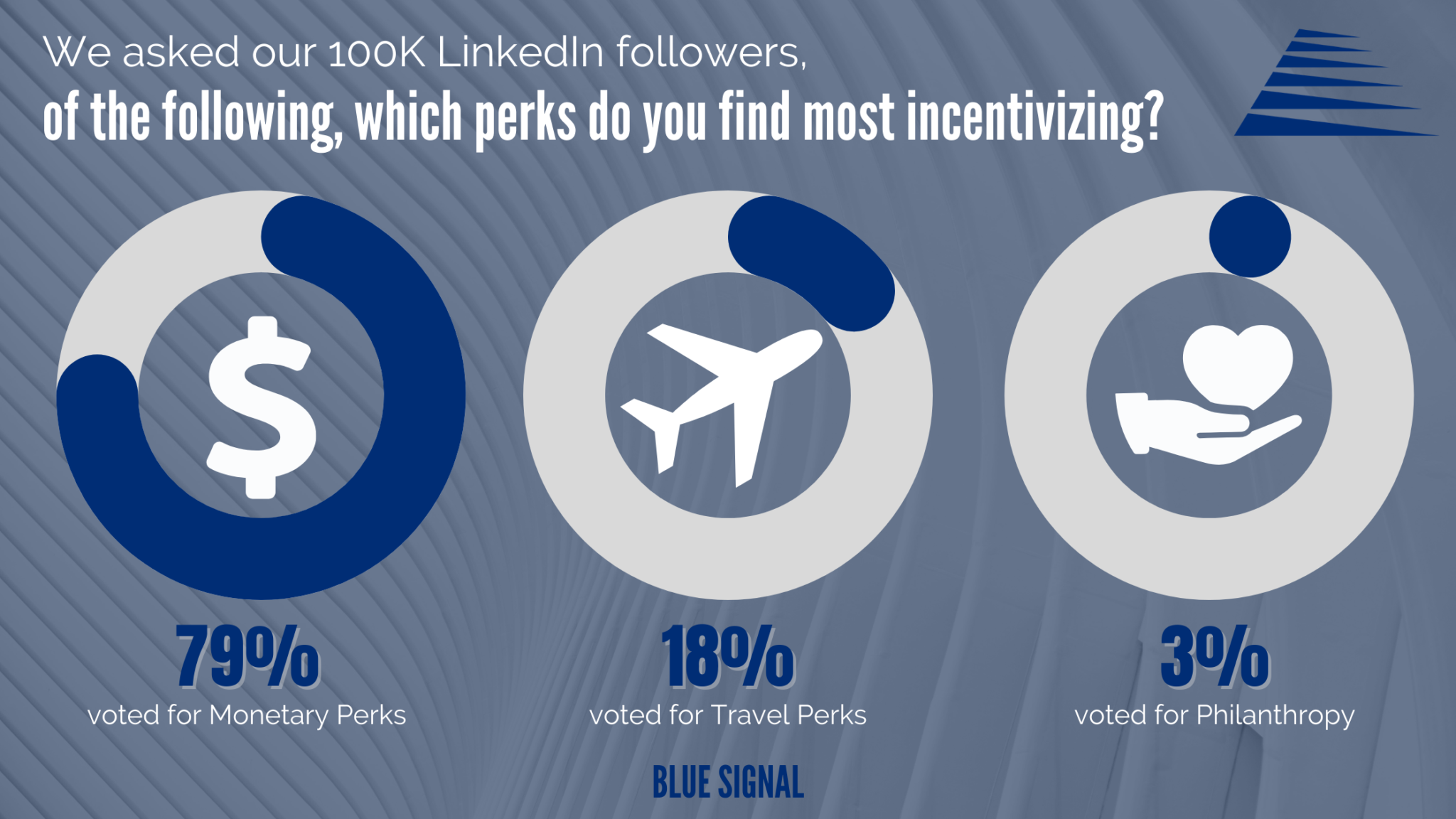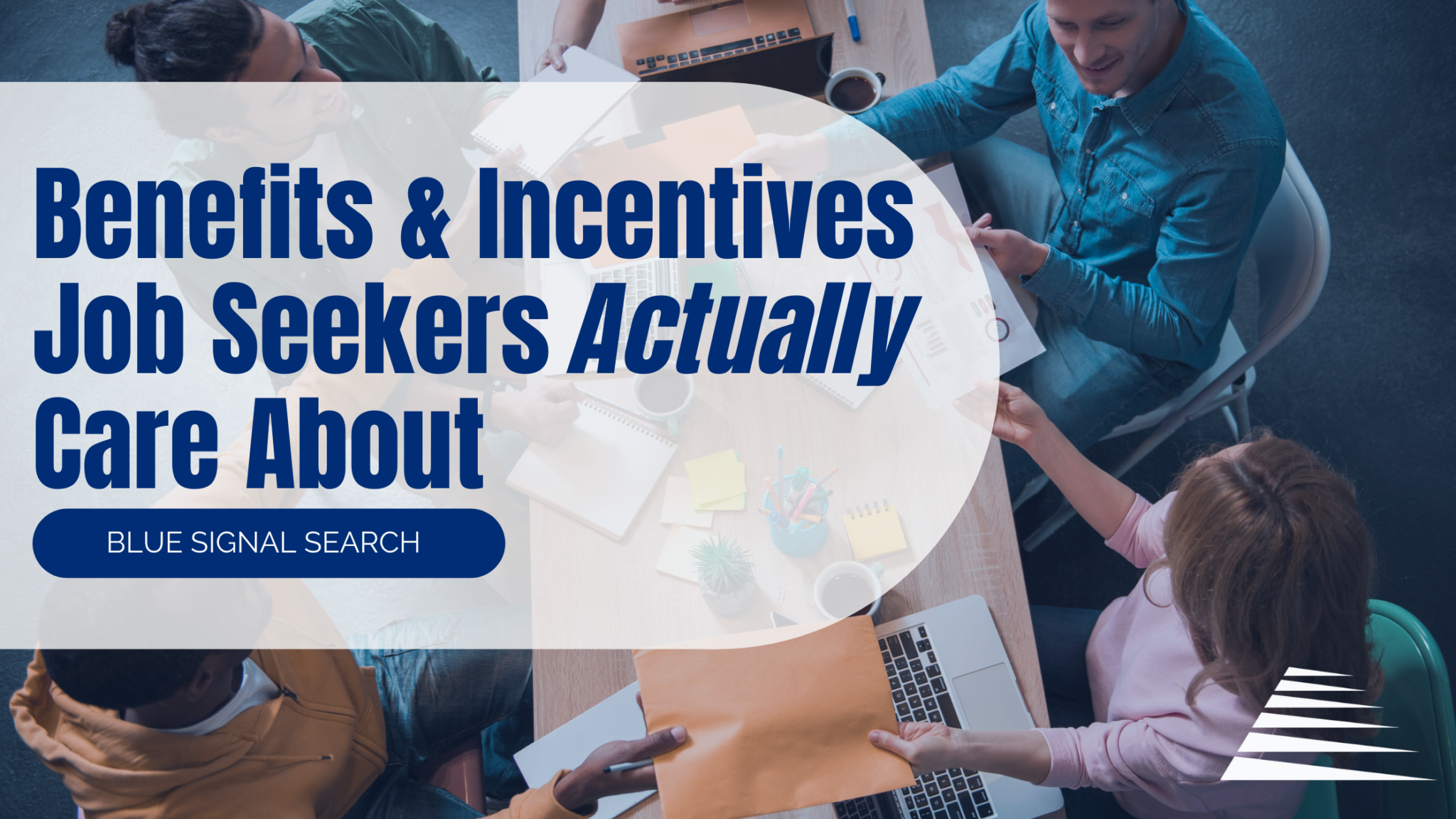With the popularity of unique perks on the rise among employees, we know that the initial job prospect and salary are not the only things attracting job seekers to a new role. According to a study by Glassdoor, about 60% of people report that benefits and perks are a major factor in considering whether to accept a job offer. Common perks and benefits that companies offer include monetary perks, like bonuses; travel perks, like paid trips; and philanthropy, like charitable donations made in the employee’s name. Some companies are renowned for their extravagant employee perks, like Google’s free gourmet food, massages, fitness classes, and gyms. Social media management company, Hootsuite, offers a nap room and a yoga studio inside of their office building, while Facebook offers four-month paid parental leave with a $4,000 “Baby Cash” bonus. While these perks seem fun and inviting, we wanted to know, do employees actually find them as a motivating factor when deciding which company to work for? Back in January, we asked our nearly 100K LI followers which perks are the most incentivizing — 79% of people voted for monetary perks, 18% voted for travel perks, and 3% voted for philanthropy. Let’s explore what this tells us about the current candidate pool and their driving factors.

Monetary Perks - Like Bonuses
According to our LI poll, 79% of people chose monetary perks as the benefit they see most incentivizing from an employer. Monetary perks can be offered in various forms, such as performance bonuses, year-end/holiday bonuses, or periodic raises. The preference for financial incentives may be because money is a tangible reward for specific behavior - whether it’s achieving sales goals or completing a project. Financial benefits are also less restrictive than other perks (compared to company vacations or philanthropic donations), and give employees the freedom to spend their reward according to their choosing. Additionally, these benefits are often more sustainable than other trendy office perks. With more than half of the American workforce working from home due to the COVID-19 pandemic, in-office perks don’t hold as much value as they once did. Monetary perks can also increase productivity and inspire better morale. A 2018 study by Genesis Associates showed that 85% of surveyed employees felt an increase in motivation when offered a monetary incentive. When used as an added bonus, monetary perks can inspire healthy competition and stronger work ethic to attain a specific goal. Although financial incentives aren’t feasible for every company, implementing them in some way may be incredibly beneficial to your employees and new talent you’re looking to hire.
Travel Perks - Like Paid Trips or Unlimited Paid Time Off
While monetary perks are fairly commonplace, travel perks such as paid trips or unlimited paid time off are more rare. According to the Journal of Economic Psychology, "when given the choice in the abstract, employees generally choose cash rewards over non-cash rewards.” However, the benefits of vacation perks may be more valuable than its monetary counterpart. Vacation perks can significantly improve employees' mental health, help avoid burnout, and increase employee retention. It has been found that 75% of employees are experiencing burnout, largely due to not taking advantage of their paid vacation days. The U.S. Travel Association reported more than half of Americans (55%) are not using their paid time off, and consequently failed to use 768 million vacation days in 2018. Despite the unused PTO, the employees aren’t entirely to blame; companies often offer unlimited vacation time as an enticing perk up front but later guilt their employees for taking advantage of it, which further perpetuates the problem. To experience less burnout and higher employee satisfaction, companies need to offer flexible, shame-free vacation perks.
Company vacations recognize the employees’ hard work and dedication to the company with a trip they may not have taken otherwise. For 18% of our LinkedIn voters, the gift of travel or vacation is appreciated more than money. Consequently, company vacations or travel incentive programs can increase productivity by 18%. The promise of a paid vacation can boost morale and lessen stress - which in turn, boosts productivity. Company vacations can almost promote team building by allowing coworkers to bond out of the office, in a less stressful environment. However, be cautious when building travel package rewards based solely on sales numbers, as it may be a deterrent for those in the company not directly involved in sales. Creating a similar contest, or implementing unlimited vacation time company-wide could be a valuable alternative.
Philanthropy - Like Donations
Employees are starting to pay attention to corporate social responsibility and how their current (or future) employer takes part. In 2016, Fortune Magazine published a survey of more than 2,000 workers that looked at the impact a company’s charitable gifts had on the workforce. They found that nearly two-thirds of Millennials were more likely to work for a company that gives to charity than one that does not. Corporate philanthropy includes companies from all industries, sizes, and sectors with a general focus on empowering communities, addressing global challenges, or protecting the planet. While participating in philanthropy checks off the box for some, others want to see how consistent the company is with backing up their mission. Employees are more likely to gravitate towards supporting causes that align with their personal values, and would like their employer to follow suit. Employers that push political agendas through philanthropy are less likely to be supported, and have the potential to cause internal (and external) backlash. Choosing a cause that is politically neutral and aligns with your employee demographic and interests is mutually beneficial to both employers and employees.
A great way to actively participate in philanthropy as a company is to create programs that employees can directly take part in. According to Givinga, “philanthropy programs that directly involve employees help create deeper connections and increase employee engagement.” When employees’ values align with the organization their company is supporting, they are more likely to be involved. Our team at Blue Signal participates in Blue Signal Gives Back, an annual company-wide incentive contest that benefits the charity or nonprofit of the winner’s choosing. Giving back to the community is a shared passion among our employees, and each year we work to incorporate those values into what we do as a company. Even though only 3% of our LinkedIn followers voted for philanthropy, we believe demand for philanthropic incentives will continue to grow. Not only does participating in philanthropy support a higher cause, it can also help your company attract and retain top-talent.
Conclusion
Attracting the most skilled candidates will take more than a competitive salary and insurance package. In this candidate-driven market, today’s top talent is looking for those additional perks to sell them on your company. In addition to recruiting, all three of these perks are proven to improve employee engagement and retention. If you’re wondering which perk(s) to implement, try reaching out directly to your employees - sending out an anonymous survey to get direct feedback on what your employees would like to see can be greatly advantageous. Utilize this blog and our other employee retention tips to attract and maintain top talent at your company.

